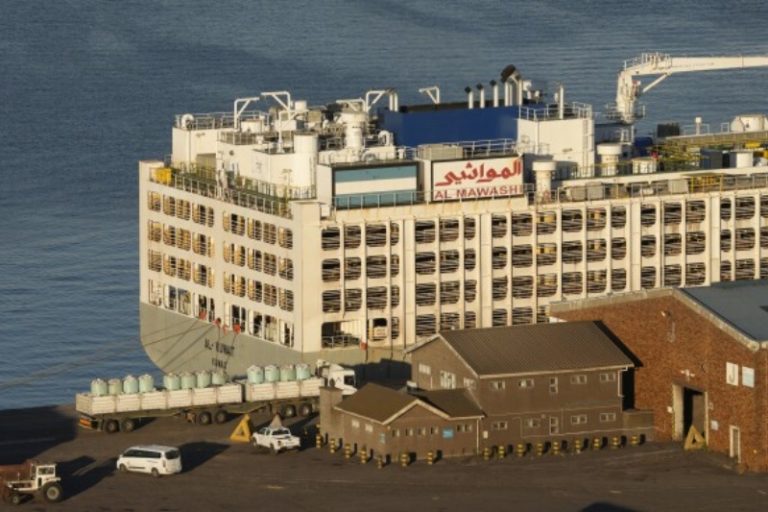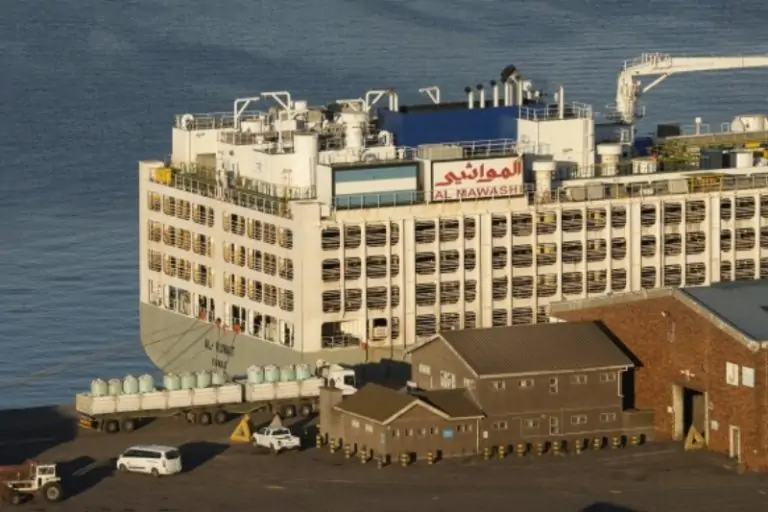

livestock ship stench shrouds cape town as authorities investigate and animal welfare groups decry conditions
Residents of Cape Town experienced an unusual start to their week as a pervasive sewage-like smell blanketed parts of the city. Authorities launched an investigation, leading them to an unexpected source: a ship harbored in the city carrying 19,000 live cattle from Brazil to Iraq. The vessel, identified as the Kuwaiti-flagged Al Kuwait, became the center of attention, with city officials inspecting sewage facilities and environmental health teams activated to address the unpleasant odor.
While the investigation uncovered the cause of the foul smell, it also exposed dire conditions for the live cattle onboard. South Africa’s National Council of Societies for the Prevention of Cruelty to Animals (SPCA) sent a veterinary consultant to assess the welfare of the animals. Shockingly, they found dead, diseased, and injured cattle, leading to the humane euthanasia of eight cows. The SPCA strongly condemned the export of live animals by sea, describing the conditions as “abhorrent” due to a buildup of urine and feces, leaving the animals with no choice but to lie in their own excrement.
South Africa’s Democratic Alliance political party, governing Cape Town, joined the chorus of criticism against live cattle exports. They highlighted the perils faced by animals during sea transport, including extreme weather conditions, injuries, and even death. The incident also reignited the debate over the ethics of live animal exports, prompting calls for a reevaluation of such practices.
As the investigation unfolded, details emerged about the cattle’s harrowing journey aboard the Al Kuwait. The 190-meter-long livestock vessel, initially docked in Cape Town to load feed for the cattle, faced scrutiny for its conditions at sea. Reports indicated that the animals spent 2½ weeks onboard, enduring a distressing accumulation of feces and ammonia. Residents of Cape Town were not only subjected to a foul smell as a result of this dire situation, but it also highlighted the difficulties faced by animals in the live export trade.
The stench wafting from the ship became a poignant reminder of the questionable practices associated with live animal exports. Not only were the public’s olfactory complaints brought up, but also, and perhaps more importantly, the horrific conditions the animals had to live in on a daily basis. The incident spurred renewed calls for stricter regulations and ethical considerations in the shipping of live animals across international waters.
The National Council of Societies for the Prevention of Cruelty to Animals in South Africa condemned Al Kuwait’s conditions as “gruesome and outdated.” The stinging criticism centered on the buildup of feces and ammonia, forcing the cattle to lie in their own excrement. The organization, which sent a veterinary consultant to assess the situation, reported the euthanasia of eight cows due to the severity of their condition.
This incident reignited the ongoing debate surrounding the ethics of live animal exports, particularly by sea. Calls for an immediate halt to such practices gained momentum as images of the cattle’s suffering circulated on social media. Animal rights advocates argued that advancements in technology and alternative methods of transporting livestock should render these archaic and distressing practices obsolete.
Beyond the immediate impact on Cape Town and the animals aboard the Al Kuwait, this incident has broader implications for the international livestock shipping industry. The public backlash and condemnation from political figures highlight the need for a comprehensive reevaluation of the standards and regulations governing live animal exports. Questions arise not only about the conditions on specific vessels but also about the overarching responsibility of countries and international bodies to ensure the humane treatment of animals during transportation.
The global community is now faced with the challenge of balancing economic interests with ethical considerations as the debate over live animal exports gains momentum. The Cape Town incident serves as a catalyst for a broader conversation about the treatment of animals in transit, urging stakeholders to reconsider the impact of their practices on both the welfare of animals and public sentiment.
Two mobile telecom leaders, MTN Group and Airtel Africa, joined forces to create a new digital infrastructure system throughout African…
South African President Cyril Ramaphosa defended his nation against claims of white discrimination made by tech magnate Elon Musk. After…
Hilton launched Signia by Hilton for its first appearance in Egypt and Africa through its hotel expansions. These hotels at…
UNICEF reported that, nearly 2900 people died of cholera across Eastern and Southern African countries while children suffer most greatly…
Enza, based in the United Arab Emirates, obtained $6.75 million in initial investment funding from Algebra Ventures and Quona Capital.…
US Secretary of State Marco Rubio ordered South African Ambassador Ebrahim Rasool to leave America by March 21 because he…
This website uses cookies.